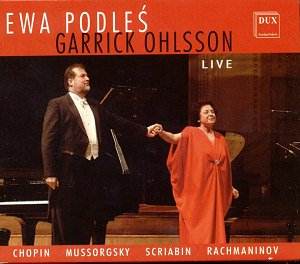The
first disc I ever reviewed for this
site was a Handel
recital from the formidable Polish
contralto Ewa Podleś. There her
powerful personality sometimes threatened
to overbalance musical proprieties but
here, on more native soil, I find her
evocative, dramatic and a characteriser
of theatrical dimensions. She is fortunate
to have Garrick Ohlsson, much admired
in Warsaw for his past success in the
Chopin Piano Competition, but also for
his continued appearances in the country.
He plays with great security and understanding
and has his solo responsibilities, as
Duke Ellington referred to them, in
the Scriabin Etudes. This is a live
recording made at the Concert Hall of
Warsaw Philharmonic in December 2002.
The sound is attractive and mellow,
applause kept to a minimum except where
naturally expected and at the end, where
it’s prolonged. The repertoire plays
to Podleś’ strengths as a recitalist;
delicate but delightfully coloured Chopin,
combustible Mussoursgky, and the romantic
fissures of Rachmaninov.
She
has recorded Chopin’s little known songs
before. On Accord 045 she essayed three
of the same songs here and these are
clearly ones close to her heart (The
Handsome Lad, Lithuanian Song, My Sweetheart)
as indeed were those songs by Szymanowski
and Karłowicz. Podleś has
a big voice – no other way to put it
– and some of her more outsize vocal
gestures will not meet universal approval
but she can lighten and scale down the
voice delightfully in these Chopin settings,
of which The Handsome Lad is a beguiling
example. Naturally that well sustained
but vaguely Clara Butt like chest register
earns its keep, notably in the Lithuanian
Song but generally these are attractive
and convincing interpretations. She
has also recorded the Mussorgsky before
on Forlane, a performance I’ve not heard,
but this Ohlsson accompanied one is
incendiary enough. She is spectral in
the Lullaby, employs dramatic portamenti
in the Serenade and florid characterisation
as well. The Field Marshall is declamatory
and powerfully climaxed; her impersonations
are truly involving, her voice registers
covering a wide and necessarily intense
range. The performance is met by initially
stunned silence – and I can well imagine
why.
The
Rachmaninov settings show another, versatile
side of her vocal equipment. She is
characterful in Christ is Risen, floats
her voice in How Long Since Love and
is full of adolescent breathlessness
at the start of In The Silence Of the
Night. Ohlsson’s Scriabin is impressive.
The contouring of the C sharp minor
Op. 2 No. 1 is not unlike Horowitz’s
1963 disc though Olsson’s voicings are
less overt and he is slightly slower,
tending to be more reflective than Horowitz’s
constantly inflecting tension. I liked
the D sharp minor Op. 8 No. 12 – Horowitz
employed quite a deal of rubato and
withdrawn tone whereas Ohlsson is much
more linear and balanced; one does though
slightly miss Horowitz’s moments of
hare-brained humour in this Etude. He
catches the otherness of the mysterious
Etude in nonas and when it comes to
the Op. 42 No. 5 C sharp minor we find
he’s even quicker than Horowitz, though
Ohlsson lacks the intensity of diminuendi
of the older man.
This
is a recital of some considerable breadth.
The Chopin songs should be in the repertoire
of more "Western" singers
and Podleś shows what we are missing.
The documentation is first class with
texts in Polish, English and Cyrillic
and thorough notes. Above all revisiting
Ewa Podleś is never a dull experience.
Jonathan
Woolf
